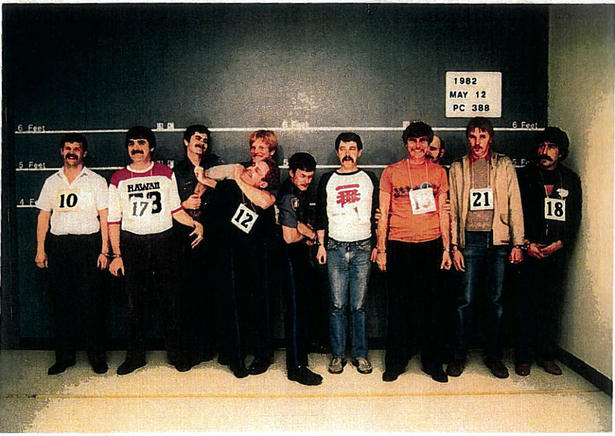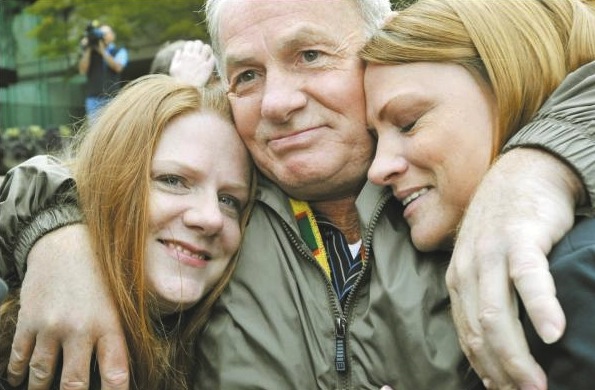
Ivan Henry’s ordeal
May 16, 2014 in Opinion
Ivan William Mervin Henry was incarcerated for almost 27 years in respect of crimes he did not commit. He was ultimately acquitted by the Court of Appeal on October 27, 2010 but has not received any compensation from the state for the miscarriage of justice that occurred in his case. Here is a timeline of some of the events in the saga:
1980-1982: Dozens of sexual assaults with a similar distinctive modus operandi occur in Vancouver.
May 12, 1982: Mr. Henry is arrested by Vancouver police and forced into a physical lineup viewed by several victims.

Ivan Henry is number 12 in this lineup photograph introduced into evidence at his 1983 criminal trial.
July 29, 1982: Mr. Henry is charged with 17 counts of sexual assault and arrested.
February 28-March 15, 1983: Mr. Henry is tried by Mr. Justice Bouck and a jury on ten counts. Michael Luchenko and Judith Milliken are the prosecutors; Mr. Henry represents himself. The Crown adduces no physical evidence linking Mr. Henry to any of the crime scenes or assaults (although perpetrator semen and other physical evidence was retrieved during the investigation) and relies only on the testimony of the complainants. Mr. Henry is found guilty of all charges on March 15, 1983 and remains in custody for sentencing.
April 12, 1983-July, 1988: More than two dozen similar sexual assaults are perpetrated in Vancouver while Mr. Henry remains in custody.
November 23, 1983: Mr. Henry is declared a dangerous offender and sentenced to an indefinite period of incarceration.
February 24, 1984: The Court of Appeal grants the Crown’s application to have Mr. Henry’s appeal from conviction dismissed for want of prosecution after he failed to obtain the trial transcripts.
November 24, 2004: Following a review of historic sexual assault cases, Donald James McRae is charged with three sexual assaults from the 1980s.
May 27, 2005: Mr. McRae pleads guilty to the charges and is sentenced to five years in prison.
November 15, 2006: Lawyer Leonard Doust Q.C. is appointed by the Criminal Justice Branch of the Ministry of Attorney General for BC to review Mr. Henry’s case to determine “whether there had been a potential miscarriage of justice.”
March 28, 2008: The Criminal Justice Branch releases a summary of Mr. Doust’s recommendations.
January 13, 2009: The Court of Appeal orders that Mr. Henry’s appeal be re-opened. Mr. Henry is released on bail pending the hearing of his appeal, with an electronic monitoring bracelet attached to his leg.
October 27, 2010: The Court of Appeal allows the appeal, sets aside the verdicts and enters acquittals, stating, among other things, “the verdict on each count was not one that a properly instructed jury acting judicially could reasonably have rendered.”

Ivan Henry with his daughters upon his acquittal and release from prison in 2010
June 28, 2011: Mr. Henry files a civil lawsuit seeking compensation for his wrongful conviction. The defendants include the City of Vancouver, the Attorney General of British Columbia and the Attorney General of British Columbia.
April 18, 2013: The BC Supreme Court decides that Mr. Henry’s claim for Charter damages against the Crown prosecutors can succeed if he establishes at trial that their conduct amounted to a marked departure from the standards expected of them.
January 21, 2014: The Court of Appeal finds the BC Supreme Court judge erred in in its decision and holds that Mr. Henry has to establish malice on the part of the trial prosecutors to succeed against the provincial Crown.
May 15, 2014: The Supreme Court of Canada allows Mr. Henry’s application for leave to appeal the Court of Appeal’s decision. The appeal is set for hearing in November of 2014. Mr. Henry’s civil claim for compensation is now scheduled to proceed to a 100 day trial commencing August 31, 2015.
May 1, 2015: Mr. Henry wins the Supreme Court of Canada case, the court overturning the Court of Appeal’s decision and holding that can be entitled to Charter damages absent prosecutorial malice.
June 1, 2016: Following a lengthy trial in the BC Supreme Court, Mr. Henry wins his case and is awarded over $8 million in damages for wrongful conviction.
Therefore, Ivan Henry lived under a cloud, asserting his innocence for 34 years, before justice was finally served and he received compensation.







 Follow this site using RSS
Follow this site using RSS

